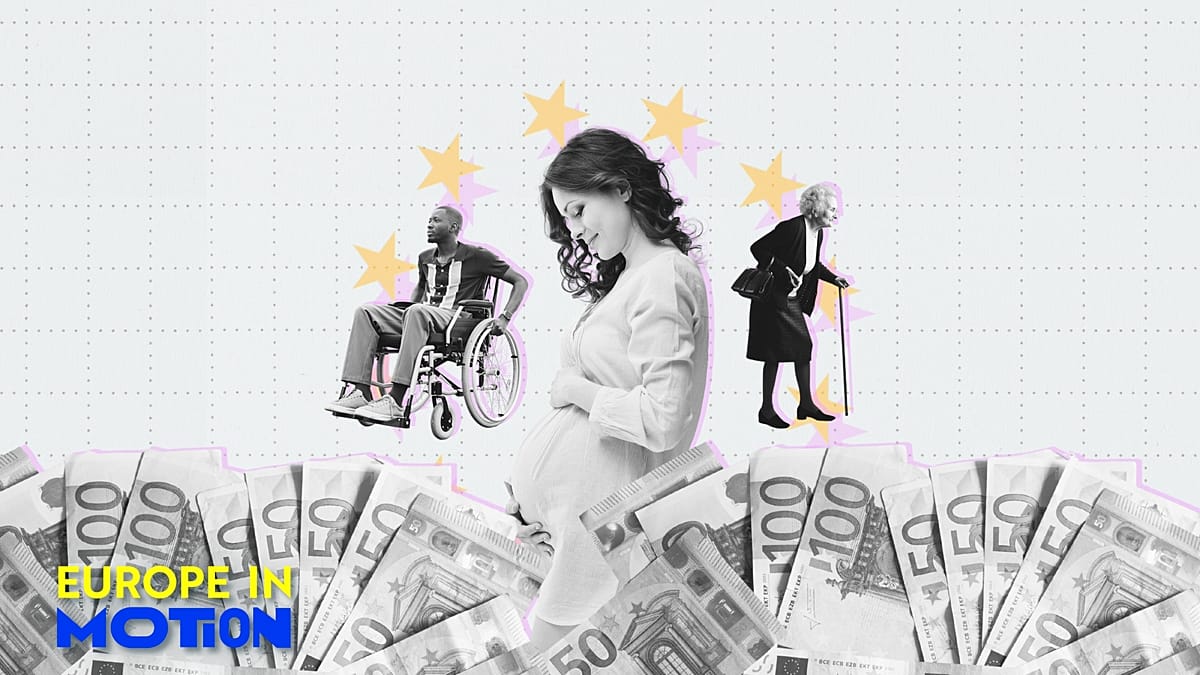All EU countries raised welfare spending in 2024, according to Eurostat data, with a global increase of nearly 7%, bringing the bloc’s total social budget to almost €5 billion.
Compared with its GDP, the average social benefit spending is now around 27% across the bloc.
But rates vary widely from nation to nation.
Finland, France and Austria are the most generous EU members, each spending around 32% of their GDP on social benefits.
Ireland sits last with only 12%, which is less than non-EU member states like Bosnia-Herzegovina (20%) and Serbia (18%), according to Eurostat.
But there are reasons for it,according to experts, including the country’s demographics.
Ireland’s society is still relatively young compared to other economies and therefore pension, long-term care and age-related health care spending is lower, Professor Bernhard Ebbinghaus, chair of macrosociology at the University of Mannheim, told Europe in Motion.
“In addition, GDP is somewhat inflated in Ireland — as in Luxembourg — because of international companies that use the country for tax purposes”, he added. “For Ireland, GNP (the total income earned by the residents) is a better indicator than GDP to understand its residents’ living standards.”
Ireland isn’t the smallest spender for all social benefits, however: it’s second in the EU when it comes to spending on social housing, proportionally to its GDP.
Pensions, unemployment, housing: Where are the biggest benefits?
In general, pensions take the biggest chunk of the EU’s social spending: €2 trillion of the bloc’s total expenditure on social benefits.
Sickness and healthcare are second with nearly €1.5 trillion, followed by family and child support measures with €0.4 trillion and disability support at €0.3 trillion.
Despite its recent controversial (and currently suspended) pension reform, which was poised to rein in government spending on pensions, France is not the EU’s biggest spender on old-age benefits, devoting 13% of its GDP to it.
The top three spots actually go to Austria (14.7%), Italy (14.6%) and Finland (14.5%).
When it comes to healthcare and sickness, Germany invests the most (9.9%), followed by France and the Netherlands (9.5%).
France leads in unemployment support (1.75% of GDP), followed by Finland (1.65%) and Spain (1.5%).
As for housing support, Finland has the top spot (0.99% of GDP), ahead of Ireland (0.72%) and Germany (0.63%), but it appears that Europeans would appreciate further spending in this regard.
In a 2025 Eurobarometer poll, lack of affordable housing emerged as the most “immediate and urgent” problem in the EU, highlighted by 40% of respondents (51% among those living in cities.
Estonia’s welfare boom: How much is it connected to inflation?
Despite an east-west divide, many of the countries spending the least seem to be catching up with the biggest spenders.
Last year, Estonia boosted its welfare spending by almost 20% — the fastest among all EU countries — followed by Croatia, with nearly 18% and Romania with 17.5%.
However, Estonia’s jump in social spending is mostly the result of indexation combined with strong wage growth, rather than a political shift toward expanding the welfare state, according to Lauri Triin, professor of comparative public policy at Tallinn University.
“The 2024 pension index rose sharply due to previous high inflation and fast-growing wages,” she told Europe in Motion. “With a sizeable pensioner population, this automatically increases expenditure.”
“Parental benefits are wage-based in Estonia, so when average wages rose by around 10%, the total cost of these benefits increased as well,” she added. “Changes in the tax-free income threshold and broader cost-of-living pressures add to this effect.”
Will Germany keep dishing out?
At the same time, the slowest increases were seen in Greece (+3.2%), Sweden (+3.9%), Italy and Denmark (+4.3% each), but, in general, all EU countries increased benefits expenditure.
According to early estimates, Germany’s social spending growth — around 6.5% — was relatively small compared to most other EU countries, but experts doubt that the country will firmly shut the lid on the public coffers any time soon.
“In Germany, pension reforms have been undertaken and further steps are currently discussed, but in 2024, additional costs due to refugees from Ukraine and economic slowdown (thus less GDP growth and more unemployment) have led to more expenditure pressures,” Ebbinghaus said.

